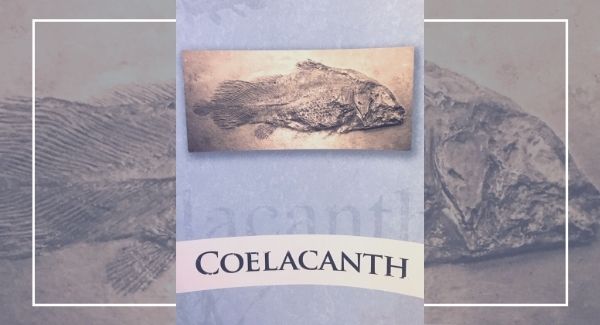Each year, students of all majors have the opportunity to submit short stories, plays, poetry, art and photography for the chance to be published in the Newman student literary journal, Coelacanth (pronounced see-luh-kanth).
The Coelacanth is traditionally revealed at the annual spring Newman literary festival — where family, friends, faculty and staff gather to listen as students present their published works. This year, due to unique circumstances, the decision was made to host a summer unveiling and reading June 15 in the Jabara Black Box Theatre.
“With COVID, we didn’t get a spring break, which is normally when we put it together, format it digitally and edit everything,” said Murphy Obershaw, this year’s editor-in-chief. “With that, and the combination of the (Arts and Literary) festival being moved up and three of us being in the play, it was a little crazy. But thankfully we got it all done.”
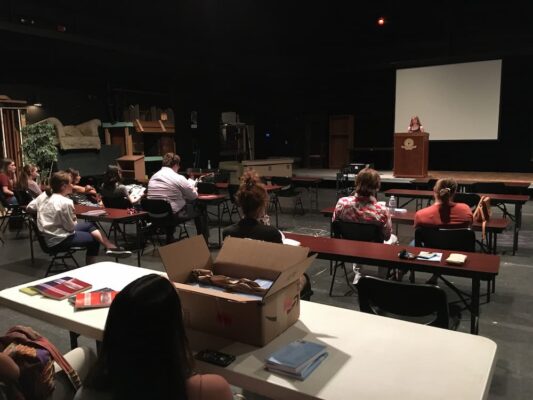
Obershaw, a recent graduate, was especially proud of her fellow peers for their efforts and resilience when it came to creating the final product.
“If someone was falling apart, another person picked up where the others left off, so it all worked out nicely,” she added.
One short story and one poem are selected as winners each academic year. The prizes include the Sister Madeleine Kisner Prize in Poetry and the Jeanne Lobmeyer Cárdenas Prize in Short Fiction, which are judged by nationally known writers and include a monetary reward.
The 2021 winners are Hadassah Umbarger for her poem, “Dark Mouth,” and Madeline Alvarez for her work of prose, “Coffee with Cream and Perfume.”
‘Coffee with Cream and Perfume’
Alvarez was hesitant to submit “Coffee with Cream and Perfume” for Coelacanth. A last-second decision to enter the piece resulted in her being the judges’ first choice for the short story category.
“I was definitely excited,” Alvarez said. “I wasn’t expecting to win at all. I’ve worked on that story for a while and I wasn’t sure it was really ready yet.”
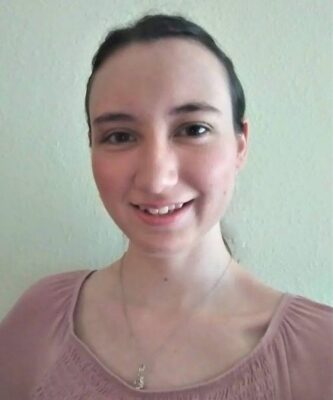
Journal staff members handle preliminary judging, and all submissions accepted for publication are considered. Nationally recognized writers then select the final winners.
The judge for the Jeanne Lobmeyer Cárdenas Prize in Short Fiction was Gina Wisker, an associate professor at the University of Bath in the United Kingdom and professor emeritus at the University of Brighton. She described Alvarez’s piece as “short, sensitive, delicate and understated.”
“It has an equally delicate technique. Through centering the strangeness of (the character) Sadie on scent, coffee, perfume, now she has returned from an abusive relationship so that the difference between the sisters is sensed rather than asserted through the smells and the accompanying behaviours.”
“The pain is never fully articulated, only seen in the bruising, distancing and hiding. This is a sensitively managed interaction,” Wisker added.
‘Dark Mouth’
The judges’ first-choice winner of the poetry prize was Umbarger. Umbarger started writing her poem months ago in a poetry class taught by Professor of English Bryan Dietrich, Ph.D.
“We were given the assignment of writing two sonnets, and it was actually one of the first times I’ve seriously written poetry,” Umbarger said. “I’m definitely a nerd for classical literature, and ‘The Odyssey’ has been one of my favorite books for years.”
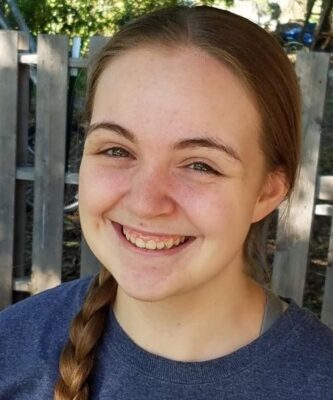
“I liked the idea of taking a more inward look at ‘The Odyssey’ and Odysseus, looking at the mental state of Odysseus years after ‘The Odyssey’ has taken place,” she added. “When I started writing it, I think I was reflecting on how I had been watching some of my friends struggle with their mental health, and I tried to make echoes of that in the way that Odysseus watches his men throughout the poem, but I can’t say how much of that has remained throughout the drafts.”
P. Andrew Miller, professor emeritus at Northern Kentucky University, was the judge of the Sister Madeleine Kisner Prize in Poetry. He found Umbarger’s poem “ambitious,” and described the language and imagery as being “both vivid and insightful for the persona.”
“(Hadassah) does a great job of creating character as she explores deep themes from ‘The Odyssey,’” Miller said. “’Dark Mouth’ wonderfully adopts the persona of Odysseus to look at the hero’s time in the cyclops cave and how that haunts him long after returning home.”
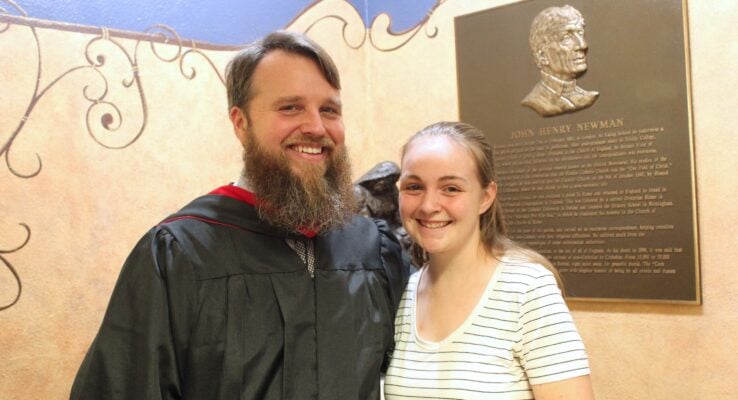
In his review, Miller mentioned that he has taught “The Odyssey” for decades in his classes, but reading Umbarger’s poem he “personally learned something new about Odysseus from reading the poem.”
Dietrich agreed, saying, “Hadassah’s poem is one of the two finest poems I’ve ever seen from a student in over 30 years of teaching poetry.”
“I still can’t believe it, to be honest,” Umbarger said. “I was one of the poetry editors for Coelacanth this year, so I had the pleasure of reading every single poem that was accepted, and I would never have guessed that something I wrote would be the winner out of all of those. I’ve been trying not to let it go to my head, but I’ve been really excited and happy at the same time.”
Turning the page
A new edition of Coelacanth is published every spring, however, students can now submit their works for possible publication in the literary journal at any time during the year. The sleek paperback is not limited to content submitted by Newman University students, either — the only requirement is that the writers and artists must be enrolled in their undergraduate studies.
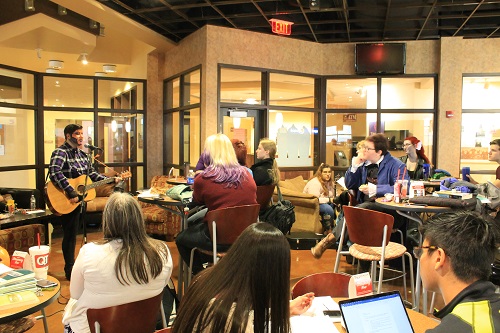
“Definitely feel free to submit your stuff,” Obershaw said. “If you want to try out a piece, you can go to Open Mic and present it, and maybe ask one of your friends for some feedback if you want it.”
The editing crew has already received five submissions to be considered for next year’s journal.
“It was a surprise to get a submission from as far away as Florida,” Obershaw said. “But you know, keep submitting and encouraging your friends to submit, even if they don’t go to Newman. Just keep Coelacanth going.”
Prose, poetry and art submissions can be emailed to [email protected] for consideration. Please note that all content must be easily transferable to black and white print.
